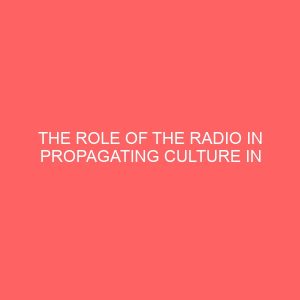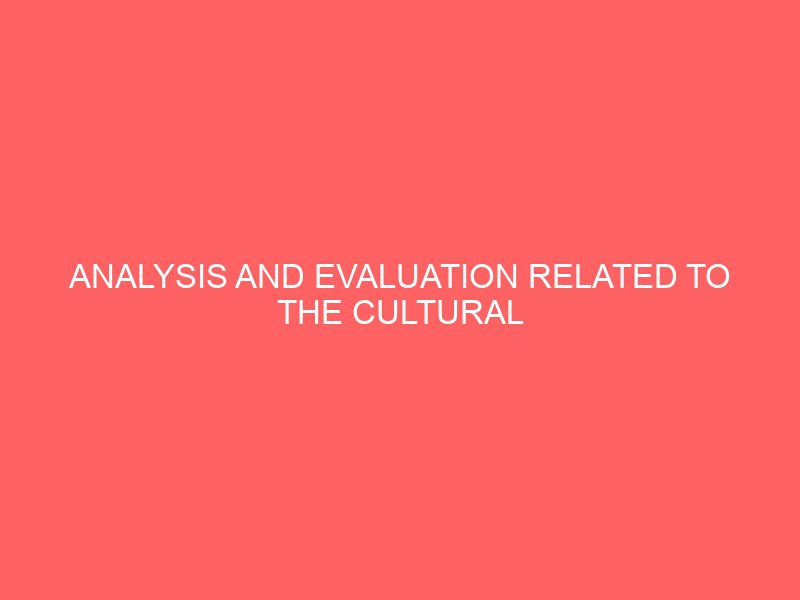Description
CHAPTER ONE
Background of The Study
This research is on Analysis and evaluation related to the cultural tourism in relation to community development and sustainability. Case study: Umuagbom community in Imo state. Community development has played a very vital role in some communities in Nigeria by eliminating suffering of like illiteracy and disease in the life of people, thus improving the standard of living of the people within the community and have also inculcate a sense of citizenship and spirit of civil consciousness among the members of the community.
Community development helps to improve the economic, social and cultural conditions of communities, by enabling its members to establish and maintain co-operative and harmonious relationship by contributing meaningfully to the achievement of the national objectives.
Community development have eradicate abject poverty in Nigeria through the provision of social amenities like water, roads bridge, electricity and hospitals. As it also seek to empower individuals and group of people with the skills they need to effect changes within their community.
According to Okiy (2013) community development is a basis for economic development and information is an important ingredient in development process. People of the community whether literate or not should have access to any kind of information which will help them to become capable and productive in their social and political obligation, to become better informed citizens generally.
According to Adekola (1997) when he asserted that community development has always been a part and parcel of African culture. And in the African society, community development has to do with working together as members of a particular community to achieve common goals that are designed to benefit the entire community.
As Yahya (2009) also opined that when a community is not developed, there will be vices that will pull such society down and lack of development has a positive correlation with the neglect of rural areas. Rural neglect brings negative consequences such as exodus of rural dwellers to urban areas, with resulting problems of unemployment, crime, prostitution, child labour, insecurity, money laundering, bribery, poverty proliferation of shanty living areas, spread of diseases and overstretching of the facilities and infrastructure in the urban areas.
From the review of the community development and its trend by previous research work, the researcher can conclude by saying that community development is the grass root to development and sustainability to the community, through which community growth commences.
There are need to drive development to undeveloped community by uplifting the community culture and values among the nation in order to avoid all these vices.
Culture tends to standout in Nigeria tourism sector as Nigeria houses about 375 ethnic groups and each of these ethnic group has her own cultural heritage which describe the total way of life of the particular group. Before the coming of the Western culture, importance was attached to the participation in any cultural festival like Iriji ndi Ngor Okpala (New yam festival). In those days, the Iriji ndi Ngor Okpala has become a national religious institution and its anniversaries are celebrated with grand festivities. The mysteries connected with it are held sacred and inviolable.
Nowadays, these beliefs have changed, people have not been participating in Iriji ndi Ngor Okpala Festival especially, and this is due to some factors that are connected with the coming of the Western culture and the various religious beliefs.
The term Festival is simply defined as “THEME PUBLIC CELEBRATION”. This term is rich in tradition and meaning. Nigeria’s cultural heritage is woven from threads of history and diversity, legend and conquest. The country aptly described as the ‘Giant of Africa’ is richly endowed with ecological and cultural resources, which are of universal recognition. The richness and diversity of the Nigeria culture is a manifestation of the socio-cultural differences of the over 250 ethnic groups in the country.
There are many traditional festivals observed in the State (IMO). Each community has different festivals celebrated in honor of ancient deities or to mark an important event in the history of the area. There are different festivals to usher in the harvest season, the most popular being the Ahiajoku Festival, which is observed in all the farming communities.
These are list of festivals within the state.
1) Eyiri-eyi Obohia
2) Iwakwa of Ihitte Afor Ukwu – Every 3 years
3) Inunkwu of Oparanadim
4) Iriji ndi Ngor Okpala (New yam festival) – every August 15th
5) Iwa –Akwa performed by Okponkume community
Most of these festivals take place within the last quarter of every year.
The research will focus on the Iriji ndi Ngor Okpala(New yam festival) as its primary point of view, since this festival is common among other community across the state (Imo).
1.2 Statement of Research
There are numbers of critical issues as concern the development of tourism in the development particularly in Africa, which have call into questioning the efficacy of tourism as a tools for community development and socio-economic .
These issues have also been identified among the people of Umuagbom community of Imo State. Which includes poor educational background, lack of good road, lack of social amenities, cultural and environmental degradation and loss of cultural identity.
And due to these problems, the researcher have been able to know note that the people of Umuagbom community haven’t been able to utilize the cultural heritage of their community and most of these cultural heritage are just been made known only to the nearby community and villages, as this has limited the celebration of their cultural heritage within close community and not beyond.
Therefore, the researcher has identify this problem among the people and community of Umuagbom of Imo state, and thereby seek to carry out this research so as to highlight cultural tourism and its efficiency in community development.
1.3 Aim and Objectives of the Study
The aim of this study is to investigate the significance of cultural tourism to community development.
The specific objectives are to:
- Examine the relationship between new yam festival and infrastructure
- Examine the relationship between new yam festival and educational advancement.
- Examine the relationship between new yam festival and social amenities
- Examine the relationship between age grade and infrastructure
- Examine the relationship between age grade and education advancement
- Examine the relationship between age grade and social amenities
1.4 Research Question
This study addressed issues relating to the following pertinent questions emerging within the domain of the study. However the research questions are itemized below as viz:
- To what extent does cultural tourism relates to infrastructure
- To what extent does cultural tourism relates to education advancement
- To what extent does cultural tourism relates to social amenities
1.5 Research Hypothesis
Six important hypothesis was formulated and will be tested in this study,
Ho1 There is no significance relationship between new yam festival and infrastructure.
Ho2 There is no significance relationship between new yam festival and educational advancement.
Ho3 There is no significance relationship between new yam festival and social amenities.
Ho4 There is no significance relationship between age grade and infrastructure.
Ho5 There is no significance relationship between age grade and educational advancement.
Ho6 There is no significance relationship between age grade and social amenities.
1.6 Significance of the Study
This research report provides an extensive analysis and evaluation related to the cultural tourism in relation to community development and sustainability. This research work will also be of great significance to the end users, adhering to the suggestion and guideline will help promote the cooperate image of Umuagbom community cultural values.
- It details historical values for the Nigerian cultural tourism sector, along with forecast figures for 2016–2020
- It provides comprehensive analysis of travel and tourism demand for cultural heritage, festivals and tourism, with values for both the 2009–2015 review periods and the 2016–2020 forecast period.
1.7 Scope of the Study
This research work will be covering Umuagbom community cultural tourism and its effect to community. This research work will also look into two of Umuagbom community festivals. This research work will be compiled using 187 research respondents.
1.8 Definition of Term
Culture: Culture is the characteristics and knowledge of a particular group of people, defined by everything from language, religion, cuisine, social habits, music and arts.
Community: A social group of any size whose members reside in a specific locality, share government, and often have a common cultural and historical heritage
Cultural tourism: (or culture tourism) is the subset of tourism concerned with a country or region’s culture, specifically the lifestyle of the people in those geographical areas, the history of those people, their art, architecture, religion(s), and other elements that helped shape their way of life
Tourism: is travel for pleasure; also the theory and practice of touring, the business of attracting, accommodating, and entertaining tourists, and business of operating tours.
Development: an event constituting a new stage in a changing situation
New Yam Festival: is an annual cultural festival by the igbo people held at the end of the rainy season in early August.
Educational Advancement: an act of moving forward, expanding and enlarging in the process of facilitating learning, knowledge, skills, values, beliefs and habits. This could be a formal or informal.
Age Grade: a group of persons of the same sex and approximately the same age having certain definite duties and privileges in common and constituting a division of a tribe or society.
Infrastructure: refer to structures, systems and facilities serving the economy of a business, industry, country, city, town, including the services and facilities necessary for its economy to function.
Social Amenities: refers to a feature that increases attractiveness or value, especially of a piece of real estate or a geographic location, contributing to physical or material comfort.








Reviews
There are no reviews yet.